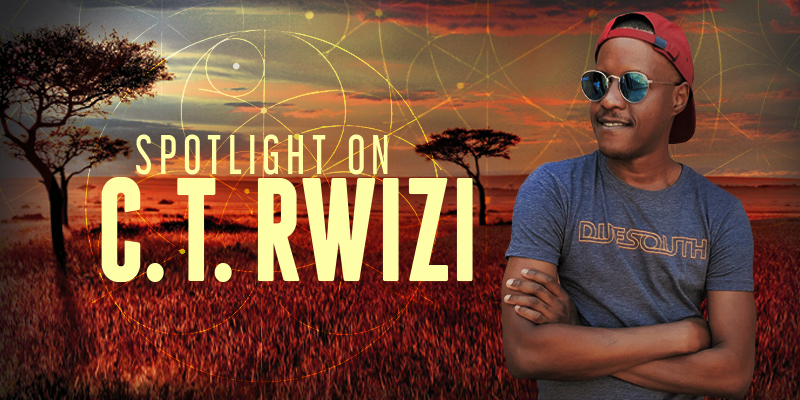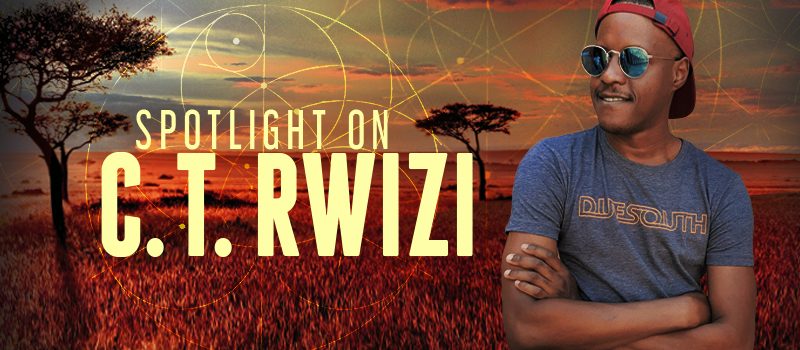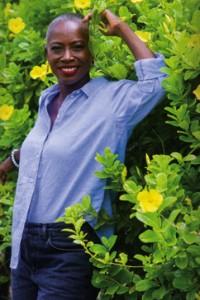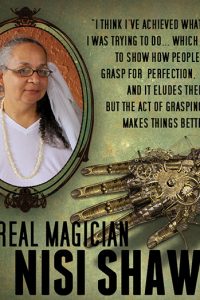Spotlight on C. T. Rwizi

Tell us about your debut novel Scarlet Odyssey. What’s it about, and what inspired you to write it?
Scarlet Odyssey follows a young man whose bookish nature and affinity for magic puts him at odds with the rest of his society, in which the path of books and magic is considered feminine, while the art of warfare is seen as the worthiest masculine pursuit. As the first-born son of a chief, he is expected to epitomize his society’s view of manhood, so his failure to do so has massive social costs for him. In Scarlet Odyssey we get to see what happens when circumstances force him to finally embrace who he is—to fully embrace magic, and therefore, himself—despite his people’s disapproval.
Scarlet Odyssey is the first in a planned series. What lies ahead for that world?
At the moment I have a two-book contract. The second book in the series, Requiem Moon, will be coming out spring of 2021, which I’m very excited about because I had a blast writing it. I’m also hopeful I’ll be able to finish off the series with a third and final book to make it a trilogy.
You were born in Zimbabwe, grew up in Swaziland and Costa Rica, attended college in the US, and now live in South Africa. How does your background influence your writing?
A good question, though not an easy one to answer. The truth is, the effects of having lived in multiple countries, of having traveled extensively, are often hard to quantify, and sound superficial when you attempt to do so. For example, the most profound realization I came to was that people are really the same no matter where you go. They might have different cultures, languages, traditions, etc., but the things they care about, the things that motivate them, that make them feel, those things are often the same and quite easy to empathize with no matter where you’re from. It sounds trite even as I say it, but it was no less an important realization for me, which is why I’m grateful I’ve had the chance to be exposed to people, languages, and environments that were unfamiliar to me over the course of my life.
I believe I carried this realization into Scarlet Odyssey in the way I built my world. There are characters from different tribes, and even some from beyond the known continent, but their ‘otherness,’ if I can use that term, did not get in the way of my ability to empathize with them. I was able to see through the skin-deep layers that set them apart, to the people beneath. Moreover, having lived in different parts of southern Africa gave me a good handle on southern African languages, myths, and cultures, which I employed quite liberally in my book.
Tell us a little about your journey from being an aspiring writer to a published one.
I always knew I wanted to go the traditional route, and I knew that the key to this was producing a book good enough for an agent to pick it up, so I took my time with my debut novel. I spent about a year and a half experimenting with different ideas as I improved my writing, and then about two and a half years working on Scarlet Odyssey. My initial round of querying in early 2018 didn’t work out—I had requests for the full manuscript but no offers of representation—so I went back to the drawing board, wrote another draft, then tried again. The second round was almost immediately successful, netting me an agent and then a book deal a few months later.
Who are some of your literary influences?
I’m a fan of big idea sci-fi on galactic scales, so I’ve been inspired by the works of Frank Herbert, Vernor Vinge, Alastair Reynolds, and Peter Hamilton. Most recently I have really enjoyed the works of Kai Ashante Wilson and N.K. Jemisin who have written amazing works that blur the line between sci-fi and fantasy.
What’s the attraction of writing fantasy instead of, say, mysteries or “literary” fiction or historicals?
I can’t speak for anyone else, but for me, the simple answer is that I love SFF. If I’m reading a book, it’s either political non-fiction or SFF. My love for SFF is what inspired me to write a book in the first place, so I was hardly going to gravitate to another genre. I may see myself incorporating aspects of other genres into my future works (e.g. a murder mystery, a heist, etc.) but I doubt I’ll ever write something that isn’t SFF.
As for “literary” fiction, I reject the idea that works of SFF can’t be included under that umbrella. To anyone who disagrees, I challenge you to pick up Too Like the Lightning by Ada Palmer or The Fifth Season by N.K. Jemisin and then tell me those brilliant works are not “literary.”
Is there anything else you’d like our readers to know? Upcoming work or other projects of note?
Requiem Moon, the sequel to Scarlet Odyssey, is coming out in March 2021, but you can pre-order it right now on Amazon. If you liked the first one, it is my very biased opinion that you’ll love the second one even more.
This promoted spotlight is exclusive to Locus Online.
 While you are here, please take a moment to support Locus with a one-time or recurring donation. We rely on reader donations to keep the magazine and site going, and would like to keep the site paywall free, but WE NEED YOUR FINANCIAL SUPPORT to continue quality coverage of the science fiction and fantasy field.
While you are here, please take a moment to support Locus with a one-time or recurring donation. We rely on reader donations to keep the magazine and site going, and would like to keep the site paywall free, but WE NEED YOUR FINANCIAL SUPPORT to continue quality coverage of the science fiction and fantasy field.
©Locus Magazine. Copyrighted material may not be republished without permission of LSFF.








